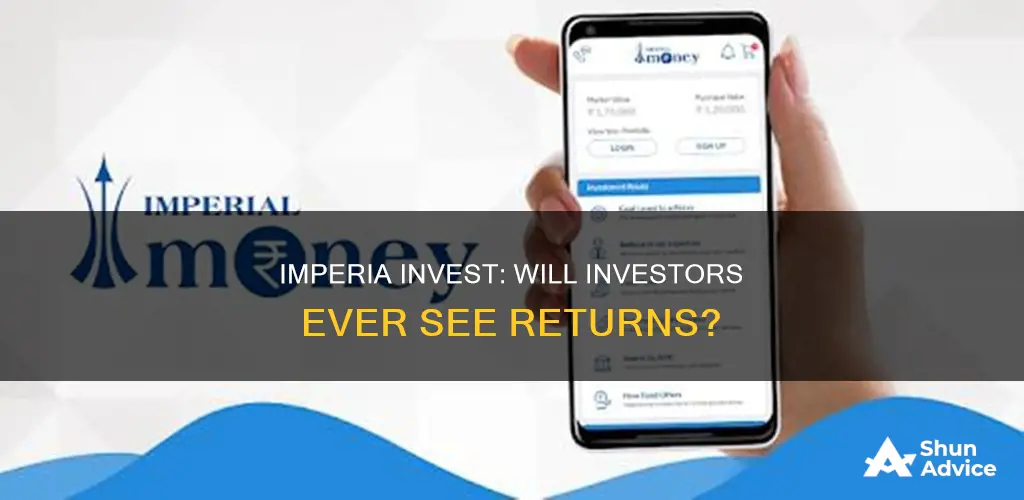
In 2010, the U.S. Securities and Exchange Commission (SEC) charged Imperia Invest IBC with securities fraud. The company had solicited several million dollars from investors, promising guaranteed annual returns of 1.2% per day, but instead funnelled investor funds into foreign bank accounts and failed to pay any money back to investors. The SEC obtained an emergency court order freezing the assets of Imperia, which had raised more than $7 million from approximately 14,000 investors worldwide, over half of whom were Deaf. Despite claims that investors could access their profits by purchasing a Visa debit card, no returns were ever paid out.
What You'll Learn

Imperia Invest IBC charged with securities fraud
On October 6, 2010, the U.S. Securities and Exchange Commission (SEC) charged the Internet-based investment company, Imperia Invest IBC (Imperia), with securities fraud. The SEC obtained a temporary restraining order and emergency asset freeze against Imperia for defrauding more than 14,000 investors worldwide, raising over $7 million, with more than half of the funds collected from deaf investors in the United States.
The SEC's complaint, filed in the U.S. District Court for Utah, alleged that Imperia defrauded investors by soliciting funds to purchase Traded Endowment Policies (TEP), the British term for viatical settlements. Imperia claimed to pay investors a guaranteed return of 1.2% per day, an unrealistic amount according to the SEC. The Imperia website stated that an initial $50 investment would allow the investor to obtain an $80,000 loan from an unnamed foreign bank, which would be used to purchase a TEP. Imperia then promised to trade the TEPs and pay investors the guaranteed return.
The SEC's complaint also alleged that Imperia falsely claimed to be licensed and located in the Bahamas and Vanuatu when it was not licensed to do business or located in either country. Additionally, Imperia stated that investors could only access their profits by purchasing a Visa debit card, despite having no relationship with Visa and using the Visa name without authorization.
To conceal the identity of its control persons, Imperia used an anonymous browser to host its website, communicated with investors via email without disclosing the identities of control persons, and established offshore PayPal-style bank accounts to hide the recipients of the investment proceeds.
The SEC has reminded investors that investment pitches offering high rates of return are a potential indicator of investment fraud and has urged investors to research the legitimacy of investments before proceeding.
Understanding Schedule D: Uncovering the Intricacies of Non-Retirement Investments
You may want to see also

Investors lost millions
The Internet-based investment company Imperia Invest IBC (Imperia) has been charged with securities fraud by the U.S. Securities and Exchange Commission (SEC). The company allegedly solicited several million dollars from investors, primarily targeting deaf investors, and promised guaranteed annual returns of 1.2% per day. However, instead of investing the funds as promised, Imperia funnelled investor money into foreign bank accounts in Cyprus and New Zealand, and investors never received any returns.
The SEC obtained a temporary restraining order and emergency asset freeze against Imperia in October 2010, after the company defrauded more than 14,000 investors worldwide. The Commission's complaint alleged that Imperia raised more than $7 million, with over $4 million coming primarily from deaf investors in the United States. This amounts to more than half of the funds collected by Imperia.
To lure investors, Imperia purported to invest in Traded Endowment Policies (TEPs), the British term for viatical settlements, and offered a guaranteed return of 1.2% per day. On its website, Imperia claimed that an initial $50 investment would enable investors to obtain an $80,000 loan from an unnamed foreign bank, which Imperia would then use to purchase TEPs. These TEPs would then be traded, and investors would be paid their guaranteed returns.
However, these promises were false, and Imperia was not licensed to conduct such investment activities. The company was not registered with the SEC or as an investment advisor or broker-dealer in any state. Additionally, Imperia falsely claimed to be licensed and located in the Bahamas and Vanuatu, when in reality, it was not licensed to do business or located in either of those places. The company also used the Visa name without authorization, stating that investors could only access their profits by purchasing a Visa debit card from Imperia, even though it had no relationship with Visa.
To conceal their fraudulent activities, Imperia took several proactive steps, including using an anonymous browser to host its website, communicating with investors via email without disclosing the identities of control persons, and establishing offshore PayPal-style bank accounts to hide the recipients of the invested funds. As a result of these deceptive practices, investors lost millions of dollars, and Imperia's assets have been frozen by the SEC to prevent further harm.
Under Armour: Buy Now or Never?
You may want to see also

Imperia's website misled investors
The Imperia Invest IBC website misled investors by making false claims about the company's legitimacy, its investment products, and the promised returns. The website was a key tool in Imperia's fraudulent scheme, which targeted deaf investors in particular.
Firstly, the website falsely claimed that Imperia was licensed and located in the Bahamas and Vanuatu. In reality, the company was not licensed to operate in either of these jurisdictions, and the address provided in the Bahamas did not exist. This false representation of their location and licensing status was a critical part of their deception, giving investors a false sense of security and trust.
Secondly, Imperia's website promoted an investment product that did not exist. They claimed to invest in Traded Endowment Policies, the British term for viatical settlements, promising returns of 1.2% per day. However, instead of investing the funds, Imperia funnelled money into foreign bank accounts in Cyprus and New Zealand, defrauding investors of their money.
The website also made false claims about how investors could access their profits. It stated that investors could only receive their returns by purchasing a Visa debit card from Imperia for a few hundred dollars. This was a scam, as Imperia had no relationship with Visa and was using the Visa name without authorization.
The U.S. Securities and Exchange Commission (SEC) has charged Imperia with securities fraud and obtained an emergency court order to freeze their assets. The SEC warns investors about the indicators of investment fraud, including promises of spectacular returns and claims of complexity to obscure details of the investment scheme.
In conclusion, Imperia's website was a central tool in their fraudulent scheme, misleading investors about the company's location and licensing, the nature of the investment product, and the method of receiving returns. The case serves as a stark reminder of the importance of thorough due diligence and caution when considering investment opportunities.
Retirement Investing: Should You Continue to Play the Long Game?
You may want to see also

Imperia's false claims about Visa
The U.S. Securities and Exchange Commission (SEC) has charged Imperia Invest IBC (Imperia) with securities fraud. One of the false claims made by Imperia was that investors could only access their profits by purchasing a Visa debit card from Imperia for a few hundred dollars. However, this was not true as Imperia had no relationship with Visa and was using the Visa name without authorization.
Imperia Invest IBC, an Internet-based investment company, has been charged with securities fraud by the SEC. The company allegedly solicited millions of dollars from investors, primarily targeting the Deaf community, and promised guaranteed returns while siphoning funds to foreign bank accounts. One of the tactics employed by Imperia was to claim that investors needed to purchase a Visa debit card from them to access their profits. This was a false claim as Imperia had no association with Visa and was using their name without permission.
The SEC's investigation revealed that Imperia raised more than $7 million from approximately 14,000 investors worldwide, with over half of the funds coming from Deaf investors in the United States. The company claimed to invest in Traded Endowment Policies and offered daily returns of 1.2%. However, investors never received any returns, and their funds were funneled to bank accounts in Cyprus and New Zealand.
The SEC has taken action by obtaining an emergency court order to freeze Imperia's assets. The investigation also found that Imperia was not registered with the SEC or any state as an investment advisor or broker-dealer. Additionally, claims made by Imperia about being licensed and located in the Bahamas and Vanuatu were also found to be false.
In conclusion, Imperia's false claims about Visa are just one aspect of their fraudulent scheme. Investors were lured by the promise of high returns and deceived into thinking they needed a Visa debit card to access their profits. This case serves as a reminder for investors to be cautious and vigilant when considering investment opportunities, especially those that seem too good to be true.
Smart Investing for the Rest of Us
You may want to see also

Imperia is not registered with the SEC
The Securities and Exchange Commission (SEC) has warned investors about Imperia Invest IBC, a web-based company that is not registered with the SEC or any state securities agency. This means that Imperia has not met the legal requirements to provide investment advice or sell securities. Despite this, Imperia has solicited millions of dollars from investors, primarily targeting deaf individuals, by promising guaranteed high returns.
The SEC has charged Imperia with securities fraud and obtained a temporary restraining order and an emergency asset freeze. The company has also been found to be using false addresses and making misleading claims about its licensing and location. The SEC urges investors to be cautious and to research companies before investing, as investment pitches offering high returns with little risk are often indicators of fraud.
One way to protect yourself from investment fraud is to verify the registration of the company and its representatives with the SEC and state securities agencies. Investors can also review the company's filings with the SEC, such as prospectuses, offering circulars, and annual reports. It is important to be skeptical of any requests for upfront fees and to ask questions about the investment, such as whether it sounds too good to be true.
By following these steps, investors can better protect themselves from fraudulent schemes and ensure that they are dealing with registered and legitimate companies. It is important to remember that if an investment opportunity sounds too good to be true, it probably is.
Investment: The Spark to Ignite Employee Engagement
You may want to see also
Frequently asked questions
No, it is not. The U.S. Securities and Exchange Commission (SEC) has charged Imperia Invest IBC with securities fraud.
The SEC charged Imperia Invest IBC with securities fraud for soliciting several million dollars from U.S. investors and promising guaranteed annual returns in excess of 1.2% per day while in reality siphoning the funds into foreign bank accounts and not paying any money back to investors.
Imperia Invest IBC allegedly raised more than $7 million from approximately 14,000 investors worldwide, with more than half of the funds coming from U.S. investors who are deaf.
Imperia Invest IBC purported to invest in Traded Endowment Policies, the British term for viatical settlements, and claimed to pay returns of 1.2% per day.
Imperia Invest IBC's website stated that investors could only access their profits by purchasing a Visa debit card from Imperia for a few hundred dollars. However, Imperia has no relationship with Visa and was using the Visa name without authorization.







